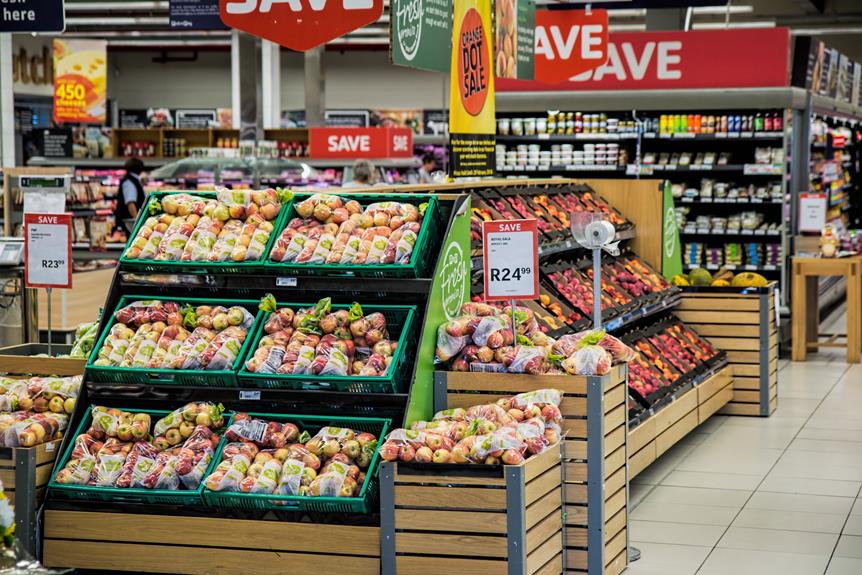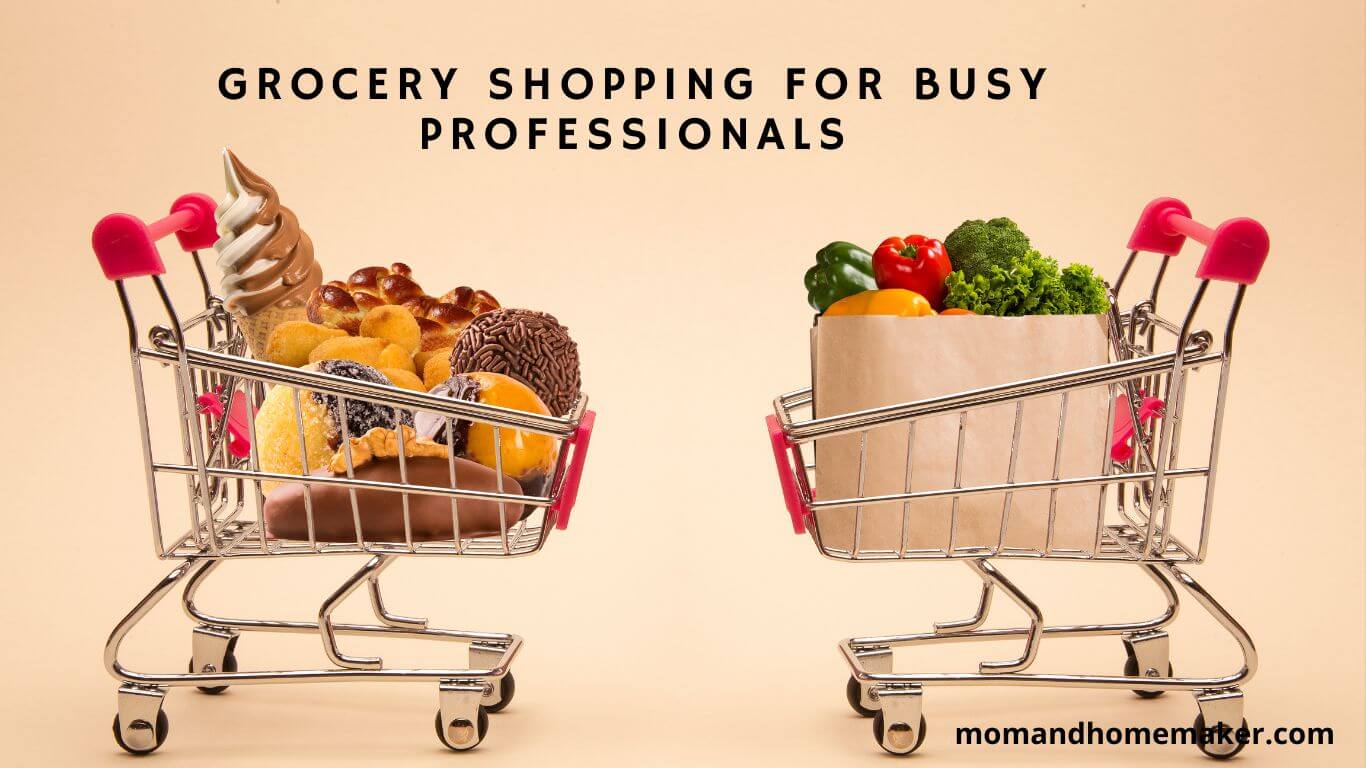Managing your finances and sticking to a budget while grocery shopping is crucial. It’s not always easy to resist the temptation of gourmet treats and fancy snacks that can quickly drain your wallet. But fear not, because there are 14 simple and effective ways to help you stay on track and save money while filling up your cart.
By planning your meals and taking advantage of sales and discounts, you can stay within your budget and still enjoy satisfying meals.
Give these tips a try and see how much you can save.

Plan Your Meals in Advance
To save money and make the most of your grocery shopping budget, start by planning your meals. Meal prep is a great way to ensure that you have nutritious and delicious meals throughout the week without overspending.
Planning your meals ahead of time allows you to create a shopping list with only the ingredients you need, avoiding impulse buys and wasted food.
When you plan your meals, it’s important to consider portion control. By preparing appropriate portion sizes, you can avoid overeating and wasting food.
This not only helps you save money but also promotes a healthier lifestyle. With portion control, you can also make your meals last longer, reducing the number of times you need to visit the grocery store.
To make meal planning easier, you can use a meal planning app or website. These tools provide recipe ideas, help you create a shopping list, and even calculate the nutritional information for each meal. They also offer the option to customize the number of servings, making it easy to adjust for portion control.
Make a Grocery List and Stick to It
Planning your meals is important for maximizing your budget and avoiding unnecessary expenses. Creating a grocery list and sticking to it can help you stay focused and organized while shopping, preventing impulse purchases that can quickly add up.
To assist you in your meal prep and portion control journey, here is a handy table to guide you in creating a well-rounded grocery list:
- Fruits and Veggies: Apples, spinach, carrots. These provide essential vitamins and minerals for a healthy diet.
- Protein: Chicken, tofu, lentils. Protein is satisfying and essential for muscle growth and repair.
- Grains: Rice, quinoa, oats. Grains are a good source of energy and fiber.
- Dairy: Milk, yogurt, cheese. Dairy products are calcium-rich for strong bones and teeth.
- Pantry Staples: Pasta, beans, spices. These versatile ingredients can be used in various recipes.
Shop With a Calculator
Using a calculator while grocery shopping can help you keep track of expenses and stay within your budget. By calculating savings and comparing prices, you can make informed decisions and choose budget-friendly options that will save you money in the long run.
When you shop with a calculator, you can easily calculate the savings you’ll get from using coupons or taking advantage of discounts. Simply punch in the discounted prices as you go through the aisles to see how much you’ll save on each item. This gives you a clear picture of the overall savings you’ll receive and helps you make smarter choices.
A calculator is also your best friend when it comes to comparing prices. By inputting the prices of different brands or sizes of the same product, you can quickly determine which option is more budget-friendly. This way, you can ensure you’re getting the best value for your money and avoid overspending on unnecessary items.
Take Advantage of Sales and Discounts
By taking advantage of sales and discounts, you can stretch your grocery budget even further. When you see items on sale, it’s a great opportunity to stock up and save money in the long run.
Look for sales on items that you regularly use in your meal prepping, such as canned goods, pasta, or frozen vegetables. Buying in bulk is another smart way to save. Many stores offer discounts when you buy larger quantities of items, so consider purchasing items like rice, beans, or oatmeal in bulk. This not only saves you money but also reduces the number of trips you need to make to the store.
Keep an eye out for coupons and special promotions as well. Sign up for loyalty programs at your favorite grocery stores to receive exclusive discounts and offers. You can also use apps and websites that provide digital coupons and cashback rewards.
Buy Generic or Store Brands
To save money on groceries, consider buying generic or store brands. Many people believe that brand names always offer better quality and taste when it comes to food. However, you might be surprised to learn that generic or store brands often provide similar nutritional value to their more expensive counterparts.
A comparison of nutritional values between generic and brand-name products has shown that there’s often little to no difference. This means you can save money without sacrificing your health.
Over the years, the quality of generic and store-brand products has significantly improved. Many grocery stores now offer their line of products that are just as good, if not better, than well-known brands. By choosing generic or store brands, you can save money while still enjoying the same great taste and quality.
Don’t be hesitant to try generic or store brands. The savings can add up, and you might find that you prefer the taste and quality just as much as the more expensive options. Give it a try and see how much you can save without compromising on the food you love.
Avoid Shopping When You’re Hungry
When you go grocery shopping, it’s important to avoid doing so on an empty stomach. Shopping while hungry can lead to impulse buying and unhealthy food choices.
To help you stay on track and make healthier choices, here are three tips to consider:
- Eat before you go: Before heading to the grocery store, make sure you have a nutritious meal or snack. This will help curb your hunger and reduce the temptation to buy unhealthy snacks or treats.
- Make a list and stick to it: Creating a shopping list before you go to the store can help you stay focused and avoid unnecessary purchases. Include healthy items that you need for your meals and snacks, and resist the urge to deviate from the list.
- Pack healthy snacks: If you anticipate being in the store for a long time, it’s a good idea to bring some healthy snacks with you. This way, if hunger strikes, you’ll have a nutritious option readily available. Consider packing some carrot sticks, apple slices, or a small bag of nuts to keep you satisfied.
Use Cash Instead of Credit Cards
To stick to your budget and make more mindful buying decisions, using cash instead of credit cards is an effective strategy. When you use cash, you have a physical representation of your spending limit, which gives you a sense of control and helps you stay accountable.
It also eliminates the temptation to overspend or accumulate debt that often comes with credit cards.
Using cash has its advantages and disadvantages. On the one hand, it makes you more conscious of your spending because you can physically see and feel the money leaving your hands. It also makes it easier to track your expenses since you can physically count the money you have left.
On the other hand, carrying cash can be risky as it can get lost or stolen. So, it’s important to be cautious and keep your cash secure.
For college students on a budget, using cash can be a valuable tool. It helps them prioritize their spending and avoid unnecessary debt. By allocating a specific amount of cash for groceries, they can make informed choices and stretch their money further.
Using cash is also a great way to teach kids about money management. It allows them to understand the value of money and the importance of budgeting. By giving them an allowance in cash and encouraging them to save and spend wisely, they develop good financial habits from an early age.
Conclusion
Next time you go grocery shopping, keep these tips in mind to stick to your budget and save money.
Did you know that the average American family spends over $7,000 on groceries each year? By using these simple strategies, you can significantly reduce your grocery expenses and have more money for other important things in life.
Take control of your budget and start making smarter choices at the grocery store today.








